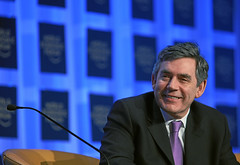Gordon Brown - World Economic Forum Annual Meeting Davos 2008
Cargado originalmente por World Economic Forum
(Gordon Brown sporting Mr. Bean's haircut at the World Economic Forum in Davos 2008 Copyright World Economic Forum Photo by Remy Steinegger)
Cargado originalmente por World Economic Forum
(Gordon Brown sporting Mr. Bean's haircut at the World Economic Forum in Davos 2008 Copyright World Economic Forum Photo by Remy Steinegger)
It appears that Mexican president Felipe Calderon is not alone amongst foreign leaders who declare their support for one of the U.S.presidential candidates. Just last week British Prime Minister Gordon Brown made headlines with his endorsement of Barack Obama. Praising the advance of progressive leadership around the world, Brown described Obama's campaign as the one "generating the ideas to help people through more difficult times". Brown made no mention in his article of what John McCain and the Republicans are contributing to the race. He has subsequently been criticized for this endorsement which has been qualified as a diplomatic blunder, with the British press arguing that leaders should maintain neutrality at all times regarding the elections in another country.
When I blogged about Calderon's wink at the McCain campaign Nonna rightly asked if this was a common practice, for a Mexican president to meddle into another country's election by announcing who his preferred winner was. My answer was no, it was not common. I also added that Calderon's words would have no impact on the Mexican- American vote. Yet I contended Calderon had good reasons to hope for a McCain win: his party has always maintained a good relation with the Republicans, the United States is Mexico's neighbour and largest economic partner and the Mexican government shares the Republican view on trade. Plus McCain's immigration stand is in tune with what the Mexican government advocates for those who cross the border in pursuit of the American dream.
The United States has traditionally and unapologetically made its preferences be known when other countries elect their leaders. With all the debate on what the "Bush doctrine" entails, one foreign policy doctrine that is well understood in the hemisphere is the Monroe doctrine with its Roosevelt Corollary. In Latin America, the United States has tried historically to exercise a veto power over the electoral choices people make when they are not in accordance with United States interests. Sometimes the United States has even recurred to military intervention or supported internal military coups in order to exercise this veto.
With the end of the Cold War, tipping electoral preferences abroad to favor American interests has required a more sophisticated approach. Declarations of United States ambassadors, American newspaper editorials, announcements made by State Department officials, all have the intention of letting Latin Americans know if a candidate would be welcomed by the United States as someone they can work with. A number of times, a United States endorsement has had the opposite intended effect as Latin American voters have chosen to reject American electoral advice (the elections and re-elections through referenda of both Hugo Chavez and Evo Morales are examples of this trend).
The Bush administration's current unpopularity in and outside of the United States and the Iraqi disaster have paved the way for the tables turning. Call it the globalization of electoral meddling. The United States meddles with elections in other countries and other countries are now meddling with the elections in the United States. In a world where United States foreign policy decisions have such a big impact on the well being of all peoples it is plain common sense for foreign leaders to have a position on the outcome of the U.S. presidential elections. Is it undiplomatic to make their preferences publicly known? Yes. Relevant to voters’ preferences in the U.S.? No. Reason enough to back a complaint from within the United States? Certainly not, as the United States would thus be forced to acknowledge and decry its current and past interventionist actions in foreign elections, many of them much more condemnable than Calderon's support for John McCain or the enthusiastic praise that Brown had for Barack Obama.

